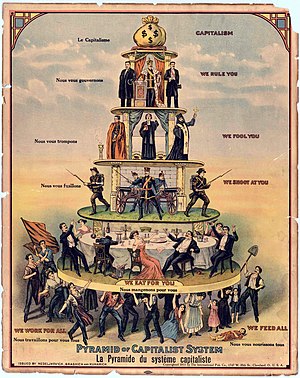Let the 'X' be a model.
1
4 1
FDR certainly noticed THE fact, to which our attention should be directed....
[Excerpt]
The phrase “bottom of the pyramid” was used by U.S. president Franklin D. Roosevelt in his April 7, 1932 radio address, The Forgotten Man, in which he said “These unhappy times call for the building of plans that rest upon the forgotten, the unorganized but the indispensable units of economic power...that build from the bottom up and not from the top down, that put their faith once more in the forgotten man at the bottom of the economic pyramid.”
Bottom of the pyramid
In economics, the bottom of the pyramid is the largest, but poorest socio-economic group. In global terms, this is the 2.5 billion people who live on less than $2.50 per day[1]. The phrase “bottom of the pyramid” is used in particular by people developing new models of doing business that deliberately target that demographic, often using new technology. This field is also often referred to as the "Base of the Pyramid" or just the "BoP".
Several books and journal articles have been written on the potential market by members of business schools offering consultancy on the burgeoning market. They include The Fortune at the Bottom of the Pyramid by C.K. Prahalad of the University of Michigan, Capitalism at the Crossroads by Stuart L. Hart of Cornell University and the first empirical article, Reinventing strategies for emerging markets: Beyond the transnational model, by Ted London of the University of Michigan and Hart. London has also developed a working paper, commissioned by the United Nations Development Programme, that explores the contributions of the BoP literature to the poverty alleviation domain.
The phrase “bottom of the pyramid” was used by U.S. president Franklin D. Roosevelt in his April 7, 1932 radio address, The Forgotten Man, in which he said “These unhappy times call for the building of plans that rest upon the forgotten, the unorganized but the indispensable units of economic power...that build from the bottom up and not from the top down, that put their faith once more in the forgotten man at the bottom of the economic pyramid.”
Prahalad proposes that businesses, governments, and donor agencies stop thinking of the poor as victims and instead start seeing them as resilient and creative entrepreneurs as well as value-demanding consumers. He proposes that there are tremendous benefits to multi-national companies who choose to serve these markets in ways responsive to their needs. After all the poor of today are the middle-class of tomorrow. There are also poverty reducing benefits if multi-nationals work with civil society organizations and local governments to create new local business models.
Meanwhile, Hart and his colleague Erik Simanis at Cornell University's Center for Sustainable Global Enterprise advance another approach, one that focuses on the poor as business partners and innovators, rather than just as potential producers or consumers. Hart and Simanis have led the development of the Base of the Pyramid Protocol, an entrepreneurial process that guides companies in developing business partnerships with income-poor communities in order to "co-create businesses and markets that mutually benefit the companies and the communities". This process has been adopted by the SC Johnson Company[4] and the Solae Company (a subsidiary of DuPont)[5].
Another recent focus of interest lies on the impact of successful BoP-approaches on sustainable development. Some of the most significant obstacles encountered when integrating sustainable development at the BoP are the limits to growth that restrict the extended development of the poor, especially when applying a resource-intensive Western way of living. Nevertheless, from a normative ethical perspective poverty alleviation is an integral part of sustainable development according to the notion of intragenerational justice (i.e. within the living generation) in the Brundtland Commission's definition. Ongoing research addresses these aspects and widens the BoP approach also by integrating it into corporate social responsibility thinking[6].
There have been a number of academic and professional conferences focused on the BoP. A sample of these conferences is listed below:
- Eradicating Poverty through Profit[7] - December 2004 in San Francisco, CA - hosted by the World Resources Institute(WRI).
- Business Opportunity and Innovation at the Base of the Pyramid[8][9] - August 2005 in São Paulo, Brazil, September 2005 in Mexico City, Mexico - two sister conferences co-hosted by WRI, the Multilateral Investment Fund and Ashoka.
- Research at the Base of the Pyramid[10] - May 2006 in Ann Arbor, MI - co-hosted by the William Davidson Institute (WDI) and the Ross School of Business at the University of Michigan.
- Business with Four Billion[11] - September 2007 in Ann Arbor, MI - co-hosted by WDI and the Center for Sustainable Global Enterprise at Cornell University.
- Sustainable Innovations at the Base of the Pyramid[12] - September 2008 in Helsinki, Finland - hosted by the Helsinki School of Economics.
- "The Bottom of the Pyramid in Practice"[13] - June 2009, hosted by the Institute for Money, Technology and Financial Inclusion at the University of California, Irvine, and sponsored by Intel Research, the UC Discovery program, and the Center for Research on Information Technology and Organizations at UC Irvine.
- "Impact of Base-of-the-Pyramid Ventures"[14] - November, 2009 in Delft, the Netherlands - hosted by the Delft University of Technology.

No comments:
Post a Comment